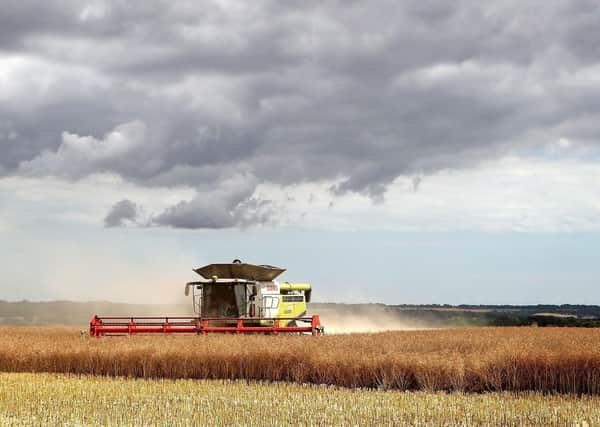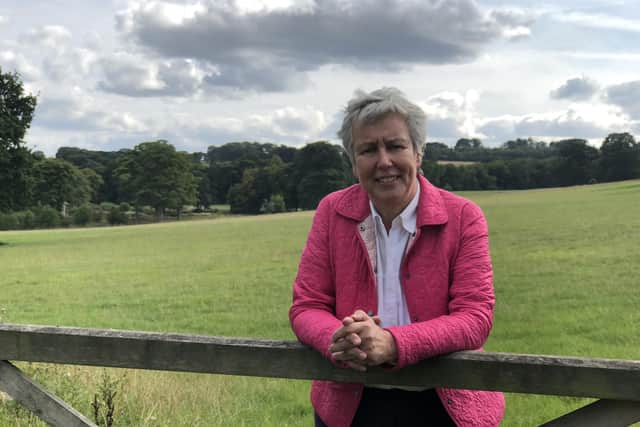How farming will come to terms with Brexit and virus – Dorothy Fairburn


Covid presented rural businesses with very few positives. For those who work in the food and farming sector, it provided an opportunity to increase the public understanding of their work in keeping food on our tables in challenging times.
In the early stages of the pandemic it was the local independent farm shops, with short supply chains and high quality, locally sourced produce, that filled a much-needed gap.
Advertisement
Hide AdAdvertisement
Hide AdRecent surveys have shown an increase in public trust of our farmers as well as significant growth in support for our farm shops with an appetite for local provenance.


2021 will be a pivotal year for farmers and landowners. The Agriculture Act will be rolled out with gradual cuts in the direct EU support payments which will result in a major restructuring of the food and farming sector, inclusive of the agri-food supply chain which is crucial to trade.
For a long time the CLA has advocated a policy that incentivises land managers to deliver public goods like creating new habitats for wildlife, action to improve soil quality and delivering high standards of animal welfare.
At the moment, details of how a proposed Environmental Land Management Scheme (ELMS) will work in practical terms is still subject to pilots being run across the country.
Advertisement
Hide AdAdvertisement
Hide AdGetting this right will provide reassurance to the farming sector as the gradual reduction in farming support will be of great concern, particularly as it is a vital revenue source for smaller farms and those in the uplands.
It is the CLA’s hope that a workable ELMS will consider differences in farms regionally, as well as at county level.
Farming in Yorkshire takes place across various landscapes and is, for instance, quite different from farming in Lincolnshire with its predominantly flat fields.
High on the policy agenda for next year will be the environment and climate change, and specifically, on how a green recovery can be implemented effectively to achieve the Government’s net zero ambitions by 2050. Landowners and farmers want to be part of the solution.
Advertisement
Hide AdAdvertisement
Hide AdAs for Brexit, and the uncertainty that has beset the economy since the 2016 referendum, the CLA has always been clear with government about the dire impact a no deal scenario would have had on certain agricultural sectors, particularly as it relates to the imposition of tariffs.
And though a deal has been achieved, the UK will not be part of the Single Market, and that will require additional customs checks and declarations on imports and exports which will significantly slow the flow of trade.
This could have a detrimental impact on perishable commodities, which could disrupt the supply chain in a similar way that Covid did (and as evidenced at Dover over Christmas). If one bit of the supply chain goes down, all of it goes down.
The tourism and hospitality industries have been particularly hard hit this year, and in May, the CLA published a Restarting the Economy paper which set out a road map on dealing with Covid, including proposals for the recovery of the rural economy which was positively received by both politicians and officials.
Advertisement
Hide AdAdvertisement
Hide AdOne of the big ‘asks’ in the CLA’s document related to the permanent reduction in VAT on tourism and hospitality businesses, which ultimately led to the Chancellor adopting this VAT reduction to the end of March in 2021.
Next year, the CLA will fight hard to make this reduction permanent in these sectors as is the situation in Europe. We accept that a permanent reduction would also reduce the Treasury’s revenue for the first couple of years, but in the longer term, it would increase demand, create jobs, and ultimately be a major asset to the regional, as well as the national economy.
We look forward to working with government and other rural bodies to ensure the recovery of, and future resilience of our rural economy.
2020 has been a year like no other but rural communities and the businesses that operate within them are extremely resilient and agile to change. They are often at their strongest when faced with adversity.
Dorothy Fairburn is regional director of the CLA.
Advertisement
Hide AdAdvertisement
Hide AdSupport The Yorkshire Post and become a subscriber today. Your subscription will help us to continue to bring quality news to the people of Yorkshire. In return, you’ll see fewer ads on site, get free access to our app and receive exclusive members-only offers. Click here to subscribe.
Comment Guidelines
National World encourages reader discussion on our stories. User feedback, insights and back-and-forth exchanges add a rich layer of context to reporting. Please review our Community Guidelines before commenting.